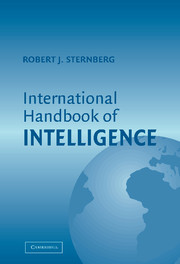Book contents
- Frontmatter
- Contents
- List of Contributors
- Preface
- 1 Intelligence Research and Assessment in the United Kingdom
- 2 Intelligence – Theory, Research, and Testing in the Nordic Countries
- 3 The Psychology of Human Intelligence in Spain
- 4 Psychology of Human Intelligence in France and French-Speaking Switzerland
- 5 Research on Intelligence in German-Speaking Countries
- 6 Is It Possible to Study Intelligence Without Using the Concept of Intelligence? An Example from Soviet/Russian Psychology
- 7 Intelligence Theory, Assessment, and Research: The Israeli Experience
- 8 Intelligence and Intelligence Testing in Turkey
- 9 Intelligence: What Is Indigenous to India and What Is Shared?
- 10 Japanese Conception of and Research on Human Intelligence
- 11 Diligence Makes People Smart: Chinese Perspectives of Intelligence
- 12 Similar Thoughts under Different Stars: Conceptions of Intelligence in Australia
- 13 Being Intelligent with Zimbabweans: A Historical and Contemporary View
- 14 Intelligence Research in Latin America
- 15 North American Approaches to Intelligence
- 16 Human Intelligence: From Local Models to Universal Theory
- Index
- References
5 - Research on Intelligence in German-Speaking Countries
Published online by Cambridge University Press: 05 June 2012
- Frontmatter
- Contents
- List of Contributors
- Preface
- 1 Intelligence Research and Assessment in the United Kingdom
- 2 Intelligence – Theory, Research, and Testing in the Nordic Countries
- 3 The Psychology of Human Intelligence in Spain
- 4 Psychology of Human Intelligence in France and French-Speaking Switzerland
- 5 Research on Intelligence in German-Speaking Countries
- 6 Is It Possible to Study Intelligence Without Using the Concept of Intelligence? An Example from Soviet/Russian Psychology
- 7 Intelligence Theory, Assessment, and Research: The Israeli Experience
- 8 Intelligence and Intelligence Testing in Turkey
- 9 Intelligence: What Is Indigenous to India and What Is Shared?
- 10 Japanese Conception of and Research on Human Intelligence
- 11 Diligence Makes People Smart: Chinese Perspectives of Intelligence
- 12 Similar Thoughts under Different Stars: Conceptions of Intelligence in Australia
- 13 Being Intelligent with Zimbabweans: A Historical and Contemporary View
- 14 Intelligence Research in Latin America
- 15 North American Approaches to Intelligence
- 16 Human Intelligence: From Local Models to Universal Theory
- Index
- References
Summary
RESEARCH ON INTELLIGENCE IN GERMAN-SPEAKING COUNTRIES
Philosophical and scientific traditions of a given region shape a researcher's conception of intelligence and the methods he or she employs to study mental abilities. In this chapter, we highlight an arguably unique aspect of intelligence research in German-speaking countries, namely, the emphasis on investigations of intellectual abilities from a contextual and/or lifespan perspective. In this research tradition, intellectual development has been considered as a dynamic lifelong process that involves a continual interplay between individuals' biological and sociocultural inheritances. Considering intellectual abilities from such a perspective goes hand in hand with a research focus on the processes and functions of intelligent behavior rather than with a focus on measuring and predicting the product of intelligence per se.
This chapter is divided into four sections. First, we review the historical tradition of lifespan developmental conceptions developed in German-speaking countries since the 18th century. Second, we introduce a modern dual-process model of lifespan intellectual development that emphasizes two distinct but interactive aspects of intelligence (i.e., the mechanics and pragmatics of the mind). Although many researchers in this region do not explicitly focus on developmental aspects, in our view, components and processes of intelligence studied can be related to the dual-process model. Hence, we use this model as an organizational framework to help structure the review of contemporary research on intelligence in the third part of the chapter.
- Type
- Chapter
- Information
- International Handbook of Intelligence , pp. 135 - 169Publisher: Cambridge University PressPrint publication year: 2004
References
- 4
- Cited by

